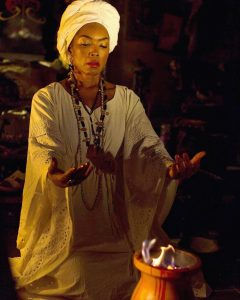Recognizing Holy Week as Ancestral Veneration
- The Afro Fairy Goddess

- Apr 4, 2023
- 3 min read
Updated: Jul 8, 2024
In my life growing up, I was always in the church. I think I've done every duty in the church except actually becoming a priestess. Growing up Anglican I hated it. I didn't really understand it. When I became an altar server and acolyte I didn't like it at first, but there were bits and pieces I did. Taking care of the candles, mixing the incense, assisting the priests in roping, cleaning the sanctuary and color changing the tools for festivals and guiding the congregation in reverence to serve. I felt most connected though, during holy week, as it was (still is?); called because it was a time to remember life and it’s transmutation towards death and rebirthing again.
Transmutation because in my current practice, energy is never done, it doesn’t die, its transformed into something else to be used again for another purpose. There were a lot of conversations about death from Maundy Thursday, (the night we washed the feet of those elders in the church and the “betrayal of Jesus” and then of course - the three hour plus service of the almost reenactment of Jesus’ death. Girl it was LOOOOONGUH!
As I grew older and I stepped away from the church for numerous reasons, and as I found God in myself, I began to understand the importance of doing things like that. Not necessarily the Christian nuances, but the recognition of death, and those who have passed on at that time. In my country's history, I found out that on Easter Monday, the enslaved had planned a revolt, to burn down every plantation in Barbados. This was led by General Bussa and his right hand woman, Nanny Grigg. It’s also the season of Emancipation, where we recognize the Ancestral idea of freedom. It's also the Crop Over Festival, where we celebrate the harvest of the sugar cane, which our Ancestors were forced to harvest. At night, if you are in the country, the air is sweet, filled with abundance and sugar in the air. I like to think that it is the Ancestors walking on holy ground, and that sweetness is to help them cross over.

Picture of Sugar Cane Plantation Workers In Barbados
However all of this energy starts on Good Friday, and we speak about all the ancestral connections for weeks, or at least unknowingly be a part of them until Emancipation Day. Last year, I did a full feast for my ancestors, and those ancestors who made an impact on my life and those in the community. Their death is our rebirth, our transmutation into black revolution. Just as it was growing up for me, that the Lenten Season was a time for sacrifice, The Season of Emancipation is where we remember the sacrifices which were done on behalf of us. Our Ancestors still live on, in our blood, and in our memories. Our Greatest Grandmother’s prayers still churn for us and bind us in protection. We still see them, in our living faces, in the reflection of mirrors and birthmarks and physical build and antics. It is this time to lift them up, higher than where we could climb or reach, honor their memories and their work. Wash the feet of the elders in your community, tell them thank you for their service as well and acknowledge them.
If Lent is about the sacrifice of Love, then what could be more powerful than the Love of an Ancestor?
Venerate we people!





Comments